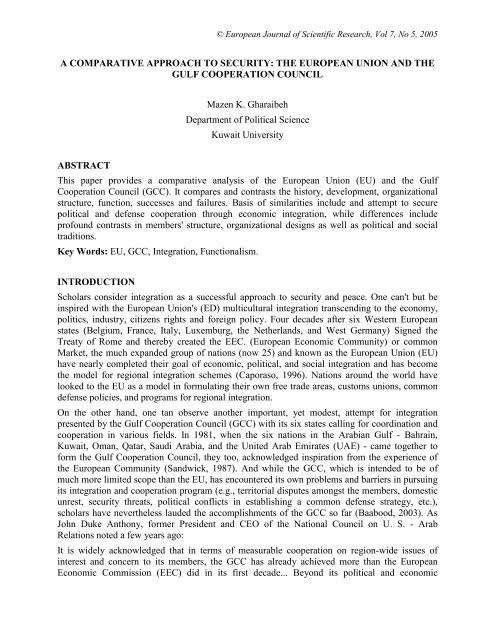European Journal of Scientific Research (ISSN: 1450 ... - EuroJournals
European Journal of Scientific Research (ISSN: 1450 ... - EuroJournals
European Journal of Scientific Research (ISSN: 1450 ... - EuroJournals
Create successful ePaper yourself
Turn your PDF publications into a flip-book with our unique Google optimized e-Paper software.
© <strong>European</strong> <strong>Journal</strong> <strong>of</strong> <strong>Scientific</strong> <strong>Research</strong>, Vol 7, No 5, 2005<br />
A COMPARATIVE APPROACH TO SECURITY: THE EUROPEAN UNION AND THE<br />
GULF COOPERATION COUNCIL<br />
Mazen K. Gharaibeh<br />
Department <strong>of</strong> Political Science<br />
Kuwait University<br />
ABSTRACT<br />
This paper provides a comparative analysis <strong>of</strong> the <strong>European</strong> Union (EU) and the Gulf<br />
Cooperation Council (GCC). It compares and contrasts the history, development, organizational<br />
structure, function, successes and failures. Basis <strong>of</strong> similarities include and attempt to secure<br />
political and defense cooperation through economic integration, while differences include<br />
pr<strong>of</strong>ound contrasts in members' structure, organizational designs as well as political and social<br />
traditions.<br />
Key Words: EU, GCC, Integration, Functionalism.<br />
INTRODUCTION<br />
Scholars consider integration as a successful approach to security and peace. One can't but be<br />
inspired with the <strong>European</strong> Union's (ED) multicultural integration transcending to the economy,<br />
politics, industry, citizens rights and foreign policy. Four decades after six Western <strong>European</strong><br />
states (Belgium, France, Italy, Luxemburg, the Netherlands, and West Germany) Signed the<br />
Treaty <strong>of</strong> Rome and thereby created the EEC. (<strong>European</strong> Economic Community) or common<br />
Market, the much expanded group <strong>of</strong> nations (now 25) and known as the <strong>European</strong> Union (EU)<br />
have nearly completed their goal <strong>of</strong> economic, political, and social integration and has become<br />
the model for regional integration schemes (Caporaso, 1996). Nations around the world have<br />
looked to the EU as a model in formulating their own free trade areas, customs unions, common<br />
defense policies, and programs for regional integration.<br />
On the other hand, one tan observe another important, yet modest, attempt for integration<br />
presented by the Gulf Cooperation Council (GCC) with its six states calling for coordination and<br />
cooperation in various fields. In 1981, when the six nations in the Arabian Gulf - Bahrain,<br />
Kuwait, Oman, Qatar, Saudi Arabia, and the United Arab Emirates (UAE) - came together to<br />
form the Gulf Cooperation Council, they too, acknowledged inspiration from the experience <strong>of</strong><br />
the <strong>European</strong> Community (Sandwick, 1987). And while the GCC, which is intended to be <strong>of</strong><br />
much more limited scope than the EU, has encountered its own problems and barriers in pursuing<br />
its integration and cooperation program (e.g., territorial disputes amongst the members, domestic<br />
unrest, security threats, political conflicts in establishing a common defense strategy, etc.),<br />
scholars have nevertheless lauded the accomplishments <strong>of</strong> the GCC so far (Baabood, 2003). As<br />
John Duke Anthony, former President and CEO <strong>of</strong> the National Council on U. S. - Arab<br />
Relations noted a few years ago:<br />
It is widely acknowledged that in terms <strong>of</strong> measurable cooperation on region-wide issues <strong>of</strong><br />
interest and concern to its members, the GCC has already achieved more than the <strong>European</strong><br />
Economic Commission (EEC) did in its first decade... Beyond its political and economic

















